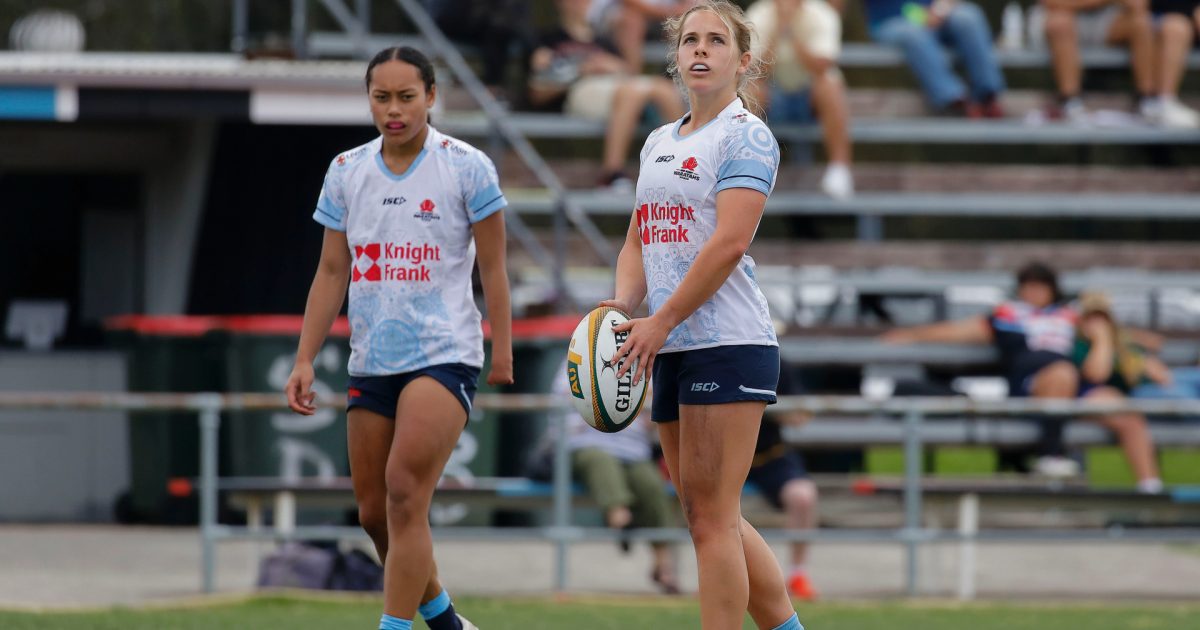Rising stars shine bright in opening round of Australia’s Next Gen Sevens

With SVNS Series superstars like Charlotte Caslick, Tia Hinds and Kaitlin Shave watching on from the sidelines, some of Australia’s emerging rugby sevens elite put on a show at Forshaw Rugby Park south of Sydney.
Maddison Levi, Teagan Levi, Faith Nathan, Madison Ashby and Bienne Terita all played in past seasons of the Next Gen Sevens before stepping up to the SVNS Series. This competition presents a golden opportunity for players to put their hand up for higher honours.
New South Wales’ 19-year-old playmaker Piper Simons, and Faagase Tupuola-Palale from Queensland, were among the players who stood out after an intriguing series of results. NSW hosted their arch-rivals in four matches on a fairly humid Saturday.
In the opening match which kicked off at 10:00 am, the Queenslanders took out the win on the back of a well-worked Rhani Hagan double and a try to Tupuola-Palale. Amahli-Sieli Hala also crossed for a five-pointer as the visitors ran away with a convincing 26-10 win.
Tatum Bird and Damita Bethan had both scored for New South Wales during an educational defeat which taught them plenty of lessons. But, to their credit, they were much better later in the day as they looked to bounce back and even take some ascendency.
Betham and Simons both scored for New South Wales, and it was enough to see them take a strong lead in game two. But, put it down to the trademark ‘Queenslander’ sporting spirit if you’d like, the visitors fought their way back.
Tupuola-Palale proved to be a handful on the right edge for the Queenslanders as the No. 14 crossed for another two tries on the back of her power and pace. The 2023 Australian Schoolgirl Sevens representative scored out wide in the final play to make the scores 12-10.
Queensland still needed the conversion to go over to avoid a loss, but it wasn’t to be as the New South Welshwomen hung for a tense victory. After two games, the ‘series’ was split at one win apiece, but there was still plenty of sevens left to play.
There was a clear winner in the third fixture with New South Wales running away with an incredible 34-nil win. Without 2023/24 SVNS Series rookie Ruby Nicholas – who was seen in casual clothing on the sidelines – the hosts had made a statement.
New South Wales took a strong lead after two tries, but they didn’t let up from there with Ella Carlisle, Milla Elaro, Tess Orton and Simons all scoring a try each. Simons also added two conversions to hand NSW Rugby Sevens a relentlessly dominant win.
Carlisle ran away to score the opener less than two minutes into the last game. It had been all New South Wales up until that point as they dominant possession – Queensland unable to get their hands on the ball as they instead gave away a couple of penalties in defence.
Queensland hit back through the pink headgear-wearing Hala and Fleur Ginn to take a 14-5 lead into the break. New Zealand-born Wallaroos representative, Carys Dallinger, scored her first try of the day a minute into the second term to extend Queensland’s lead.
Captain Faythe Manera crossed for a try right on the 10-minute mark to give the visitors a 24-5 lead. Dallinger’s conversion from directly in front added another couple of points to Queensland’s advantage which they appeared to be in little danger of surrendering.
While New South Wales managed to strike back about 90 seconds later, time just wasn’t on their side. They set up for a kick-off with less than two minutes to play – they trailed by 16-points at this stage too – and the restart didn’t clear the 10-metre line.
Queensland’s ball.
The visitors controlled possession for about a minute until knocking the ball on. But then, the clock turned red and while New South Wales managed to score in the final play, it wasn’t enough to see them avoid defeat.
With two wins each and some individual brilliance on show, it was an overwhelming successful opening round of the Next Gen Sevens. Even Kaitlin Shave, who debuted on the SVNS Series last season before going on to earn selection in the Olympics squad, was impressed.
“Next Gen is such an amazing comp for the girls coming through,” Shave told RugbyPass and Rugby.com.au on Saturday morning.
“It allows you to showcase what you’ve bene working hard with your club and your state back at home and stuff like that.
“It’s a good opportunity to go out and play and have fun with our teammates while also showcasing what you have in front of some coaches that might be having a bit of a look around.
“For me, I think last year when I played Next Gen was a really great opportunity for me to put myself forward for selections and stuff like that.
“If you look at our team now, our Australian team, there’s quite a few girls that played both in the Queensland New South Wales (teams).
“It’s a great lead into Australia A or even getting selected for the Australia program.”
Next Gen Sevens Series 2024
Round 2 – Saturday 12 October, Toowoomba Sports Ground, Esat Toowoomba.
Round 3 – Sunday 20 October, Byron Bay Rugby Union Club, Byron Bay.em
HSBC SVNS Perth takes place on 24-26 January at HBF Park. Plan your ultimate rugby weekend in Western Australia with the help of flexible travel packages including tickets and accommodation. Buy Now or Find Out More.

























































